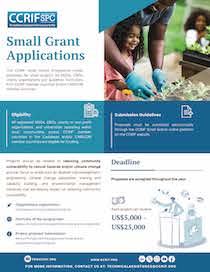Nate is the sixteenth tropical cyclone of the 2017 Atlantic Hurricane Season. It formed as a tropical depression in the southwestern Caribbean Sea on 4 October at 1500UTC and it became a tropical storm on 5 October at 1200UTC before making landfall on the Nicaragua coast.
Nate is the sixteenth tropical cyclone of the 2017 Atlantic Hurricane Season. It formed as a tropical depression in the southwestern Caribbean Sea on 4 October at 1500UTC and it became a tropical storm on 5 October at 1200UTC before making landfall on the Nicaragua coast. Its core passed over eastern Nicaragua with tropical-storm-force winds over the Atlantic coastal area. Heavy rainfall was experienced over the coastal waters of Nicaragua, as well as tropical- storm-force winds with higher gusts.
This report describes the results of the Excess Rainfall model (XSR 2.0) on CCRIF member country Barbados during rains associated with Hurricane Maria. Other reports have been issued regarding other CCRIF member countries that have Excess Rainfall policies and were affected by Maria.
Maria, the 15th named tropical cyclone of the 2017 Atlantic Hurricane Season, formed as a tropical storm on 16 September at 2100UTC, east-southeast of the Lesser Antilles. It was upgraded to hurricane status on 17 September at 2100UTC. Maria intensified moving across the Atlantic Ocean and reached the Leeward Islands near Dominica as a major hurricane (category 5) on Monday 18 September at approximately 2345UTC.
This report presents the impacts of Maria on CCRIF member countries the Turks and Caicos Islands and The Bahamas.
The preliminary runs of CCRIF’s loss model for wind and storm surge produced government losses for the Turks and Caicos Islands above the attachment point for its Tropical Cyclone (TC) policy.
Maria is the fifteen named storm of the 2017 Atlantic Hurricane Season. It formed as a tropical storm on 16 September at 2100UTC, east-southeast of the Lesser Antilles and it was upgraded to hurricane status on 17 September at 2100UTC. Maria intensified moving across the Atlantic Ocean and reached the Leeward Islands near Dominica as a major hurricane (category 5) on 18 September at approximately 2345UTC.
This report presents the impacts of Maria on CCRIF member countries the Turks and Caicos Islands and The Bahamas.
This report presents the impacts of Maria on CCRIF member countries Antigua and Barbuda, Anguilla and St. Kitts and Nevis. Another Event Briefing Report will be issued for other CCRIF countries that are affected.
Maria is the fifteen named storm of the 2017 Atlantic Hurricane Season. It formed as a tropical storm on 16 September at 2100UTC, east-southeast of the Lesser Antilles and it was upgraded to hurricane status on 17 September at 2100UTC.
This report describes the results of the Excess Rainfall model (XSR 2.0) on CCRIF member country Anguilla. Other reports have been or will be issued regarding other CCRIF member countries that have Excess Rainfall policies.





